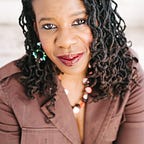New Police Chief in Charlottesville, Va. Talks of Sustainable Change
Last August, the city of Charlottesville,Va., made national headlines for a White supremacist rally that turned violent. James Alex Fields Jr., drove into a group of protesters, killing 32-year-old Heather Heyer and injuring several others. And recently, three White men were convicted for the vicious beating of DeAndre Harris, a 20-year-old African American man, in a parking garage during the Unite the Right rally.
In May, RaShall Brackney-Wheelock was appointed Charlotteville’s first African American female police chief. A native of Pittsburgh, Brackney-Wheelock received her undergraduate and master’s degrees from Carnegie Mellon. She earned a Ph.D. from Robert Morris University in 2017. Brackney-Wheelock joined the Pittsburgh Police Department in 1985, where she stayed for 30 years. During her three decades in Pittsburgh, she became one of the first African American women to run a SWAT team and graduate from the FBI National Academy. Brackney-Wheelock also completed the United States Secret Service Dignitary Protection course. After her long tenure in Pittsburgh, she became the first African American chief of police for the George Washington University Police Department in 2015. Brackney-Wheelock talked to The Crisis about her new role in a community still healing from last year’s racial tensions.
The Crisis: What are your thoughts on the racial violence that took place in Charlottesville last summer?
Brackney-Wheelock: It’s tragic that we’ve had to have an event like Charlottesville to have some meaningful dialogue that has been sustained. Charlottesville is that flashpoint for us to have long-term conversations because, now, it triggers a response in almost every single one of us. But Charlottesville’s just not about the march that day. There are a lot of complaints that have come out of Charlottesville about disproportionate contacts between the police and minority communities — over-policing, militarizing and policing. That’s the stuff I’ve been doing work on for years and decades. This isn’t new for me. It’s not a fashion statement when it comes to trends in law enforcement.
CRISIS: What does the community want?
BRACKNEY-WHEELOCK: What’s interesting is whether it’s Charlottesville, whether it’s Pittsburgh, whether it’s Ferguson, whether it’s Baton Rouge, you hear the exact same thing. Communities want to be valued and respected in their community and they want that equity when it comes to respecting their communities. What they’ve said to me is they don’t want to be over-policed or over-charged in terms of criminal justice. They want to be heard. They want you to understand that they’re not anti-government, anti-law enforcement, anti-policing. What they really want is the justice part in the criminal justice system, and that’s what they want from me. They also have been very vocal that they want a police chief, regardless of who it was, to be someone who’s invested in that community. They want to just be heard and be a part of a process and not feel as though from the beginning the deck is stacked against them.
CRISIS: What do you hope to achieve as the new police chief in Charlottesville?
BRACKNEY-WHEELOCK: Stabilizing is the first thing, within the department and within the community. Make a commitment to the community that I’m staying. Make a commitment to the officers that I’m staying. And then the second thing is, as a chief, to assess where we are. Before I can stop any bleeding, I need to know where we’re bleeding from and I use that both metaphorically and intentionally. Getting to know the communities for me is important.
CRISIS: What is your biggest fear?
BRACKNEY-WHEELOCK: I don’t want to fail a community I’m going in to serve. I don’t want the community to place their faith in me and I can’t deliver. I’m not going to be perfect at this, but I don’t [want to] bring any harm to that community. I don’t want to add to their burden. It’s those kind of things that concern me. It’s not those technical skills or abilities. It’s those intangibles that I might fail a community and add to their pain.
CRISIS: Anything you want to add?
BRACKNEY-WHEELOCK: This is our opportunity for a reset. This is our opportunity to control the narrative about our space and our place. Let’s do it with integrity. Let’s do it with honesty. Let’s do it with purpose of vision. And let’s not continue to have conversations that don’t lead to any significant or sustainable change.
— Lottie L. Joiner is editor of The Crisis Magazine
Originally published at www.thecrisismagazine.com on August 9, 2018.
